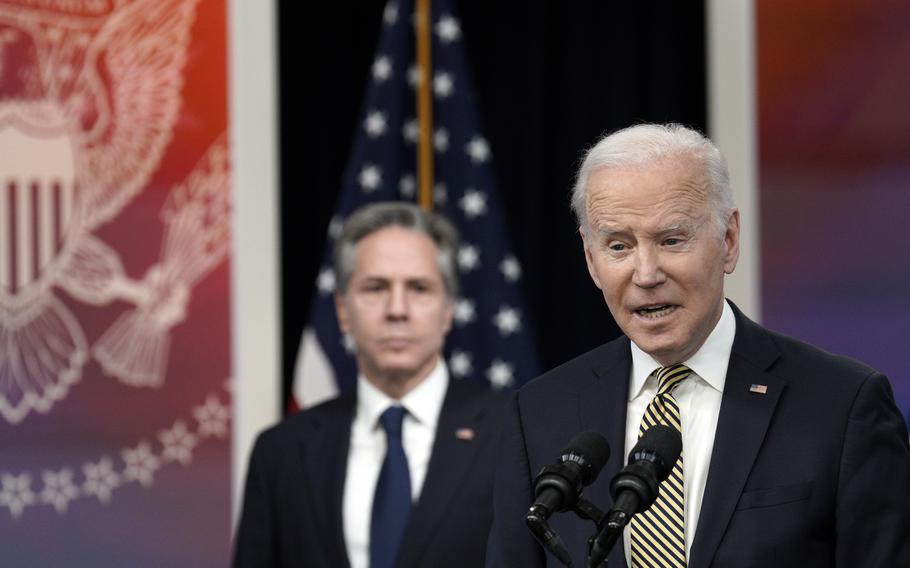
U.S. President Joe Biden delivers remarks next to Secretary of State Antony Blinken on economic and military assistance to Ukraine in the South Court Auditorium at the White House in Washington, D.C., on Wednesday, March 16, 2022. (Yuri Gripas)
Secretary of State Antony Blinken said the U.S. will seek to influence China’s behavior by shaping “the strategic environment around Beijing” in a speech that took direct aim at President Xi Jinping’s performance in leading the world’s second-biggest economy.
“This is a charged moment for the world,” Blinken said Thursday in a speech laying out the Biden administration’s approach toward China. “We cannot rely on Beijing to change its trajectory. So we will shape the strategic environment around Beijing to advance our vision for an open, inclusive international system.”
Blinken warned that China is seeking to dominate the industries of the future. He said the U.S. response will be to bolster investment at home; work closely with allies, particularly in the Indo-Pacific; and compete with China on a “level playing field.” He said Xi’s government is actively undercutting the international system that aided China’s rise, while saying the U.S. doesn’t seek a new Cold War with Beijing.
“Rather than using its power to reinforce and revitalize the laws, agreements, principles and institutions that enabled its success, so that other countries can benefit from them too, Beijing is undermining it,” Blinken said. “Under President Xi, the ruling Chinese Communist Party has become more repressive at home and more aggressive abroad.”
The top U.S. diplomat’s comments were unusually direct. He praised the U.S. for having the world’s “most powerful military” and lauded American-created Covid-19 vaccines that have been shown to be more effective than those made in China. He emphasized that the U.S. is providing millions of vaccines to other nations without political strings attached.
Blinken said the U.S. doesn’t want to “sever” China from the global economy, but warned that “Beijing, despite its rhetoric, is pursuing asymmetric decoupling, seeking to make China less dependent on the world and the world more dependent on China.” And he said that businesses shouldn’t sacrifice Western values in seeking access to China’s markets.
In terms of areas of potential cooperation, Blinken cited climate change, food security, Iran and North Korea nuclear programs and “global macro coordination” as the global economy recovers from the worst of the Covid-19 pandemic.
“In short we will engage constructively with China wherever we can, not as a favor to us or anyone else, and never in exchange from walking away from our principles,” he said.
Those passages about cooperation aren’t likely to be seen as the takeaway message in Beijing. The unusually frank rhetoric against China’s government comes after tensions between the nations soured further over what the U.S. sees as China’s tacit support for Russian President Vladimir Putin’s war in Ukraine and comments by President Joe Biden suggesting the U.S. would take military action to defend Taiwan in case of invasion.
Blinken said U.S. policy toward Taiwan hasn’t changed -- “we do not support Taiwan independence,” he said -- but he added that America has a “strong unofficial relationship” with Taipei. And he said that the war in Ukraine won’t distract the Biden administration from what it sees as its key long-term challenge.
“Even as President Putin’s war continues, we will remain focused on the most serious long-term challenge to the international order - and that is the one posed by the People’s Republic of China,” Blinken said.
Despite signaling for months that the administration’s China strategy was ready for public airing, key unresolved issues remain, including the fate of $300 billion in tariffs Biden inherited from the Trump administration. A top U.S. trade official said Wednesday that the administration’s review of those tariffs is likely to take months.
Thursday’s speech came after months of delays and internal deliberations, as well as Blinken’s Covid-19 diagnosis earlier this month. As a result, it followed instead of preceded Biden’s travel to Asia last week, where he unveiled a new 13-nation Indo-Pacific Economic Framework designed to counter China’s influence. The U.S. didn’t invite China to join the economic framework and hasn’t revealed the criteria for other nations to join.